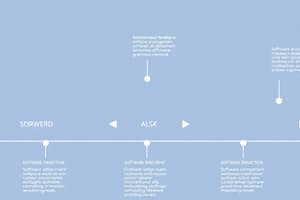Podcast
Questions and Answers
What is the primary aim of applying engineering principles to software development?
What is the primary aim of applying engineering principles to software development?
- To minimize the lines of code written by developers.
- To create high-quality software that meets user needs economically. (correct)
- To reduce project management overhead.
- To enhance the use of cutting-edge technology.
In what way does software engineering enhance software products, projects, and processes?
In what way does software engineering enhance software products, projects, and processes?
- By using whichever method is fastest.
- By systematically applying engineering principles to improve each aspect. (correct)
- By only focusing on product updates.
- By ignoring outdated methods.
What initiated the development of SWE as a distinct discipline?
What initiated the development of SWE as a distinct discipline?
- The term was coined.
- IEEE-CS/ACM starting to establish SWE as a discipline. (correct)
- IEEE-CS/ACM forming a committee.
- The publication of the SWEBOK guide.
- ACM's initial establishment of software licensing.
Why did the ACM withdraw from SWEBOK efforts?
Why did the ACM withdraw from SWEBOK efforts?
What is the particular focus of SWEBOK V4's incorporation of public review?
What is the particular focus of SWEBOK V4's incorporation of public review?
Which of the following is NOT a key objective of the Software Engineering Body of Knowledge (SWEBOK)?
Which of the following is NOT a key objective of the Software Engineering Body of Knowledge (SWEBOK)?
Which of the following activities falls under 'Software Construction' in the context of SWEBOK?
Which of the following activities falls under 'Software Construction' in the context of SWEBOK?
In the SWEBOK guide, what does 'Software Configuration Management' primarily address?
In the SWEBOK guide, what does 'Software Configuration Management' primarily address?
What is the main purpose of 'Software Engineering Models & Methods' as defined in SWEBOK?
What is the main purpose of 'Software Engineering Models & Methods' as defined in SWEBOK?
How does understanding 'Software Engineering Economics' benefit software projects?
How does understanding 'Software Engineering Economics' benefit software projects?
How does software engineering enhance 'Software Product Improvement?'
How does software engineering enhance 'Software Product Improvement?'
According to the material, what contributes to the deterioration of software over time?
According to the material, what contributes to the deterioration of software over time?
What is the primary challenge that software engineering helps mitigate in 'Software Project Improvement'?
What is the primary challenge that software engineering helps mitigate in 'Software Project Improvement'?
What approach to the software design and development process is considered problematic and why?
What approach to the software design and development process is considered problematic and why?
How is software engineering viewed in relation to computer science?
How is software engineering viewed in relation to computer science?
What is one of the restrictions when using the title "software engineer"?
What is one of the restrictions when using the title "software engineer"?
According to the material, what are the 'Four Cs' that IEEE CS lists as reasons to become certified?
According to the material, what are the 'Four Cs' that IEEE CS lists as reasons to become certified?
What is the intention of the 'Software Engineering Code of Ethics and Professional Practice' published by IEEE-CS/ACM?
What is the intention of the 'Software Engineering Code of Ethics and Professional Practice' published by IEEE-CS/ACM?
Within the eight principles of software engineering ethics, what does the 'Product' principle emphasize?
Within the eight principles of software engineering ethics, what does the 'Product' principle emphasize?
What does the 'Colleagues' principle in software engineering ethics advocate?
What does the 'Colleagues' principle in software engineering ethics advocate?
How do ethics apply to SWE management?
How do ethics apply to SWE management?
In the area of software requirements, what activity does SWEBOK highlight?
In the area of software requirements, what activity does SWEBOK highlight?
According to the principles for Engineers, how should they act?
According to the principles for Engineers, how should they act?
What does SWE improve?
What does SWE improve?
IEEE Computer Society provides what?
IEEE Computer Society provides what?
Flashcards
Software Engineering
Software Engineering
Applying engineering principles to the software development process.
First draft (1996) of SWEBOK
First draft (1996) of SWEBOK
Aims to define boundaries and arrange topics of the software engineering body of knowledge.
First SWEBOK Guide (2001)
First SWEBOK Guide (2001)
Intended to start discussion of what the SWE discipline is and required knowledge/skills.
Second SWEBOK Guide (2004)
Second SWEBOK Guide (2004)
Signup and view all the flashcards
SWEBOK V3 (2013)
SWEBOK V3 (2013)
Signup and view all the flashcards
SWEBOK V4 (April 15, 2024)
SWEBOK V4 (April 15, 2024)
Signup and view all the flashcards
Consistent view
Consistent view
Signup and view all the flashcards
Scope
Scope
Signup and view all the flashcards
Contents
Contents
Signup and view all the flashcards
Topical access
Topical access
Signup and view all the flashcards
Curriculum
Curriculum
Signup and view all the flashcards
Software Requirements
Software Requirements
Signup and view all the flashcards
Software Design
Software Design
Signup and view all the flashcards
Software Construction
Software Construction
Signup and view all the flashcards
Software Testing
Software Testing
Signup and view all the flashcards
Software Maintenance
Software Maintenance
Signup and view all the flashcards
Software Configuration Management
Software Configuration Management
Signup and view all the flashcards
Software Engineering Management
Software Engineering Management
Signup and view all the flashcards
Software Engineering Process
Software Engineering Process
Signup and view all the flashcards
Software Engineering Models & Methods
Software Engineering Models & Methods
Signup and view all the flashcards
Software Quality
Software Quality
Signup and view all the flashcards
Software Engineering Professional Practice
Software Engineering Professional Practice
Signup and view all the flashcards
Software Engineering Economics
Software Engineering Economics
Signup and view all the flashcards
Computing Foundations
Computing Foundations
Signup and view all the flashcards
Mathematical Foundations
Mathematical Foundations
Signup and view all the flashcards
Study Notes
- Problems in software engineering are due to a lack of technical competence
Announcements
- TA office hours are available Monday to Friday
- HW2 is available and due in 9 days. You need to install/learn Ruby and Ruby on Rails
What is Software Engineering
- Software engineering applies engineering principles to software development
- Concepts from CE/CS, management, math, and systems engineering are used
- Involves analysis, design, implementation, and maintenance of software systems
- Aims to improve software products, projects, and processes.
- The ultimate goal is to create high-quality software that meets user needs economically
Brief History of Software Engineering
- 1968: The term "Software Engineering" was first used
- 1975: The first journal, "Transactions on Software Engineering," was published by the IEEE Computer Society
- 1976: IEEE-CS established a standard committee on SWE
- 1993: IEEE-CS/ACM began working to establish SWE as a discipline
- 1996: IEEE-CS/ACM drafted the SWE body of knowledge (SWEBOK)
- 2000: ACM withdrew support
- 2001, 2004, 2013, 2024: The SWEBOK Guide has been published and revised
History of SWE Body of Knowledge (SWEBOK)
- First Draft (1996): Intended to define the boundaries and topics of the SWE body of knowledge
- First SWEBOK Guide (2001): Began discussions about the nature of the SWE discipline, and the required skills for software engineers
- Second SWEBOK Guide (2004): Expanded knowledge and skills included gathering input from professionals, societies, and agencies. It published 10 general knowledge areas
- SWEBOK V3 (2013): Current version
- SWEBOK V4 (April 15, 2024): Incorporates public review, Agile, DevOps, Software Architecture and Software Security
Software Engineering Body of Knowledge (SWEBOK) Main Objectives
- Promotes a consistent understanding of software on a global scale
- Defines the scope and clarifies the relationship between software engineering and other fields
- Characterizes the core content of software engineering
- Provides organized access to the body of information
- Provides a basis for curriculum development, certification, and licensing
15 General Knowledge Areas in SWEBOK Guide
- Software Requirements involves analyzing, specifying, and validating the needs and constraints for a software product
- Manage requirements during the software product lifecycle
- Software Design defines the architecture, components, interfaces, and other characteristics of a system
- Software Construction involves creating working software through coding, verification, testing, and debugging
- Software Testing validates that software behaves as expected through a set of test cases
- Software Maintenance plans for post-delivery operations and maintainability
- Software Configuration Management tracks and controls changes in the software as it evolves
- Software Engineering Management includes planning, estimating, measuring, controlling, and managing risk
- Software Engineering Process focuses on work activities for developing, maintaining, and operating software
- Software Engineering Models & Methods structures software engineering activities
- Software Quality ensures conformance to all requirements
- Software Engineering Professional Practice promotes ethical conduct
- Software Engineering Economics involves decision-making in a business context
- Computing Foundations include understanding the environment in which the software evolves
- Mathematical Foundations include using basic techniques for reasoning
- Engineering Foundations includes skillsets that are relevant to all engineering activities
Software Engineering Benefits
- Software engineering improves programming knowledge and skills
- The software engineering applies engineering principles bringing 3 improvements: in product, project and process
- Software product improvement involves enhancing the quality and aspects of individual software components or complete systems through increased function and design quality
- Software project improvement helps mitigate problems during software development like effort estimations, scheduling and requirements
- Software process improvement contributes to a more skilled and disciplined software development for building and maintaining high-quality systems
Software Deterioration
- Software does not wear out; it deteriorates with changes, defects and instability
- Software engineering techniques are intended to reduce overall deterioration
Related Disciplines
- Software engineering is sometimes viewed as a subset of computer science
- It is sometimes considered a separate discipline
- It shares boundaries with computer science, mathematics, management, and computer/system engineering
- The Software Related Body of Knowledge Guide V3 (SWRBOK V3) is related to all listed
The "Software Engineer" Title
- U.S. law restricts the use of "engineer" titles without a license
- It depends on practicing software engineering for the employer, focusing on the employer's products, and avoid offering services to other parties
- State laws may vary
Certification
- Certifications in American Society for Quality improve employability
- IEEE Computer Society Associate/Professional Software Developer/Master
Four Cs to Become Certified
- Current: To stay current with industry best practices
- Connected: To network with experts in the field
- Career-minded: To improve for promotion or opportunity
- Committed: To advance the profession
Code of Ethics & Professional Practice
- IEEE-CS/ACM has two goals: educating engineers and informing the public
- Code of Ethics has eight principles in its short version
- Two versions both provide sub-principles.
All Eight Principles for Software Engineers
- Public: Act in the public interest
- Client & Employer: Act in the best interest of the client and employer
- Product: Ensure the highest standards
- Judgment: Maintain integrity and independence
- Management: Promote an ethical approach to management
- Profession: Advance integrity
- Colleagues: Support colleagues
- Self: Promote ethical practice
Studying That Suits You
Use AI to generate personalized quizzes and flashcards to suit your learning preferences.




